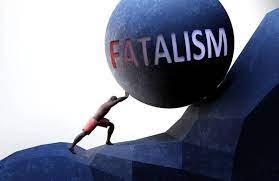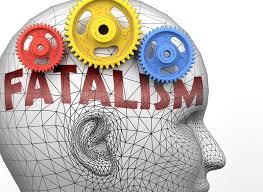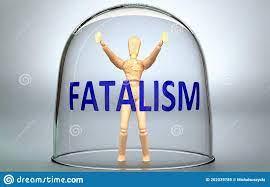What Is Fatalism?
Curated from: verywellmind.com
Ideas, facts & insights covering these topics:
7 ideas
·322 reads
Explore the World's Best Ideas
Join today and uncover 100+ curated journeys from 50+ topics. Unlock access to our mobile app with extensive features.
What Is Fatalism?
Fatalism is the belief that events are predetermined by fate or destiny, and that humans cannot do anything to change them.
Fatalists believe that everything that happens has already been decided by some higher power, and there is nothing we can do to change it. This can lead to a feeling of resignation and hopelessness, as people may feel that there is no point in trying to change anything because it will not make a difference.
Another term that is used interchangeably with fatalism is determinism. This is the belief that all events are determined by causes that have already been set in motion.
6
96 reads
History of Fatalism
The concept of fatalism has been around for many centuries and can be traced back to the ancient Greeks. For example Aristotle, said “What is, necessarily is, when it is; and what is not, necessarily is not, when it is not.” The Stoics believed that humans should accept what is going to happen, as it is impossible to change it.
During the Middle Ages, fatalism was often used as a way to give meaning to natural disasters or other events that could not be explained.
Fatalism has also been used as a political philosophy, with some leaders using it to justify their actions.
6
56 reads
Signs of Fatalism
Fatalism can be seen in many different areas of life. For example, some people may have a fatalistic attitude towards their job, believing that they cannot do anything to change their situation. This can lead to them feeling unhappy and demotivated at work.
Other people may have a more general fatalistic outlook on life, believing that everything is predetermined and that they have no control over their own destiny. This can lead to them feeling hopeless and resigned, as they may feel that there is no point in trying to improve their situation.
6
39 reads
Types of Fatalism
Hard fatalism reflects the belief that humans have no control over their own destiny and that everything is predetermined. This means that people believe that they cannot do anything to change the course of their life, no matter what they do.
Soft fatalism is the belief that humans have some control over their destiny, but that there are still some things that are predetermined.
Moderate fatalism is the belief that humans have a significant amount of control over their own destiny, but that there are still some things that are predetermined.
6
36 reads
Implications of Fatalism
People who have a fatalistic outlook may be more likely to take risks such as not following road safety rules, as they may believe that it will not make a difference.
Fatalism can also lead to feelings of resignation and hopelessness, as individuals may feel that they have no control over their own fate. This can lead to them giving up hope, as they may believe that there is no point in trying to change the outcome.
Fatalism can also have a negative impact on mental health, as it can lead to anxiety and depression.
6
33 reads
Concepts Related to Fatalism
Determinism is the belief that while our actions may be determined by prior causes, we still have some control over them.
Predestination is the belief that some people are destined for salvation or damnation regardless of their actions. People may still have some control over their destiny.
Free Will is the belief that we have the power to choose our own actions and that we are not predetermined by fate or destiny.
Optimism is the belief that good things will happen, even in the face of adversity.
6
26 reads
Fatalism Quote
“It is a singular fact that most men of action incline to the theory of fatalism, while the greater part of men of thought believe in providence.”
-Honore de Balzac
“Fatalism is a false premise. What will be is not necessarily what must be.”
-Pearl S. Buck
6
36 reads
IDEAS CURATED BY
CURATOR'S NOTE
Fatalism Defined
“
Tom Joad's ideas are part of this journey:
Learn more about problemsolving with this collection
The importance of physical activity
The role of genetics in lifespan
How to maintain a healthy diet
Related collections
Similar ideas
5 ideas
Carpe Diem: Seize the Day
effectiviology.com
11 ideas
10 Philosophical Concepts You Should Know
thecollector.com
11 ideas
Self-Empowerment: 7 Ways to Empower Yourself
online.maryville.edu
Read & Learn
20x Faster
without
deepstash
with
deepstash
with
deepstash
Personalized microlearning
—
100+ Learning Journeys
—
Access to 200,000+ ideas
—
Access to the mobile app
—
Unlimited idea saving
—
—
Unlimited history
—
—
Unlimited listening to ideas
—
—
Downloading & offline access
—
—
Supercharge your mind with one idea per day
Enter your email and spend 1 minute every day to learn something new.
I agree to receive email updates








